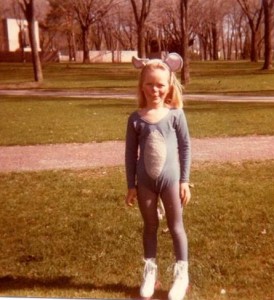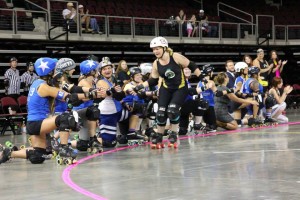I spent a good portion of the ‘70’s curled up around my parents’ record player, listening to Jim Croce croon about the Roller Derby Queen he’d fallen in love with – a woman whose fans called her Tuffy and friends called her Spike. Tuffy/Spike raised eyebrows, she was a woman loved for her strength, one “built like a ‘fridgerator” who “knew how to scuffle and fight.” As a girl I never wanted to be a princess. But this roller derby queen thing? This was the sort of royalty I wanted to become one day.

Because roller derby was an option only in my dreams, I tried other outlets that might fulfill my penchant for pushing myself, for raising eyebrows, and for playing to a crowd. My career as a ballerina was cut short after my mother heard one too many complaints about my itchy tutu. My dreams of becoming the next Ian Anderson were dashed when my flute teacher told me I’d have to give up having friends or a life if I really wanted to be a professional musician. In college I tried my hand at broomball and rugby but I hadn’t yet developed the courage needed to leave it all on the rink or field. And though I ran a few marathons in my 30s, I’m skeptical of anyone who claims to really enjoy distance running. I mean, come on. Runner’s trots and bloody nipples? How are these things fun?
Roller derby re-entered my life just as I was wrapping up my 39th year and staring down the barrel of the big 4-0. As much as it pains me to fess up to something so trite, I suppose I was facing the proverbial midlife crisis. I’d gained weight. New gray hairs had sprouted. I worried that I’d given too much to my job and not enough to the people I loved or to myself.
I’d received tenure a few years before and was feeling restless, not sure what to do now that the chase of the thing I’d been chasing since what felt like forever had come to an end. Sure, there was the next promotion but I longed for something other than work to fill my time and to occupy my mind.
Yet I had no real passions. No hobbies. Other people I knew loved reading voraciously, building furniture, knitting sweaters, climbing rock walls, running marathons (or so they said). I wanted to have something I loved, something that was mine but that wasn’t the next paper or presentation or promotion. Something that harkened back to my life-long desire to raise eyebrows and to try scary, challenging things.
An invitation from a former student who had become part of a growing movement of women looking to bring flat track roller derby to my area led me to find myself covered in protective gear and hugging the wall at my local roller rink. I had laced up a pair of skates and was going to give it my best shot. As luck would have it, I fell. Hard. I got back up. I fell. Again.

For the next few years, I continued to fall and continued to get back up. More than 30 years since Jim Croce first sang to me about the adventures of his Roller Derby Queen in my parents’ basement, I’ve taken a great many spins round and around the track myself. I became my own version of Croce’s “meanest hunk of woman” I’d ever seen. And, just as Croce described, I learned how to scuffle. I reveled in the realization that being “built like a ‘fridgerator” was a good thing, a royal thing even.
To become this sort of royalty requires determination, a willingness to scuffle, and grander-than-princess aspirations. It requires an interest in what, in my humble opinion, is one of the coolest darn things some of the coolest darn women in the world give their heart and their soul to in order to be a part of something bigger than themselves, something that challenges them to be their best selves.
Popularized in the 1960’s, the derby of 50 years ago was typically run by male business owners for a largely male spectator audience. Today, roller derby is run by and for women. As a feminist sociologist of gender, I love the diversity of gender expressions that are allowed and encouraged in derby. I love how derby simultaneously embraces and challenges normative expressions of gender. I love the contrariness of it all, the eyebrow raising-ness of it all.
Most of the sociological research on roller derby comes from fellow gender scholars who are interested in how roller derby challenges what we think about gender, how we think about gender, and how we “do” gender. As sociologist Jennifer Carlson put it in her 2010 article in the Sociology of Sport Journal, “Roller derby provides an aggressive, high-contact environment in which to interrogate femininity.”
Carlson, like other sociologists who study derby, is especially interested in the balance that derby members strike between their athleticism and the sport’s theatrical edge. It is perhaps because of the theatrical liberties allowed by the sport that derby players are so successful at both calling our attention to our cultural biases when it comes to representations of gender and forcing us to question those biases.
Travis Beaver, who wrote about derby in the Journal of Sport & Social Issues, argues that the “do-it-yourself” philosophy of today’s roller derby is a crucial value of derby’s revival. Doing it themselves ensures that the skaters – the women athletes – retain control over their training, their organizations, and the future of the sport.
While derby players may have grander-than-princess aspirations in common, one clear finding to emerge from the sociological research on derby is that players are by no means a homogenous group. Kylie Parrotta, a sociologist at Delaware State University, wrote her dissertation on tensions between sub-groups of derby participants based on differential investments in the identities “rollergirl” versus “athlete.” She also explores how skaters balance work and family obligations with their commitments to the sport – not an easy task! Parrotta says that skaters’ athletic careers may be shaped by other aspects of their identities that are linked to gender, such as motherhood.
While the sociological research raises questions about the extent to which roller derby is or can be transformative in terms of gender, I think sociologist Adele Pavlidis put it best when she wrote, “Roller derby smashes through dichotomous thinking that ranks and privileges men over women, but only if we let it. Right now there is an opportunity not to be missed, an opportunity for women to be watched and admired … on their own terms and with their own rules.”
On an individual level, roller derby has without a doubt been transformative for me. It has challenged my own too-often dichotomous thinking. It has pushed me to figure out my own terms and my own rules – and to live by them. It was my passion at a time when I very much needed one and it is an experience for which I will be eternally grateful.

Comments 1
Gayle Sulik — February 12, 2015
Roller derby queen, smashing through dichotomous thinking, figuring out your own rules, the contrariness of it all. That's fantastic. I love knowing this about you, Amy. Skate on in whatever form that takes. I know you will.